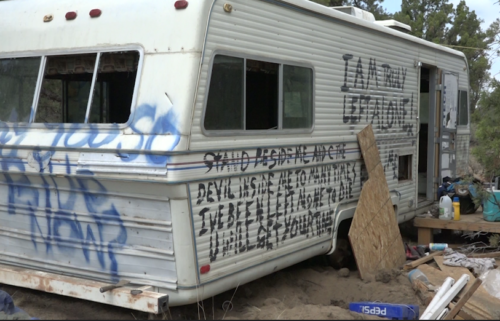Gov. Kotek, Legislature want to pause action on wildfire hazard map to quell public frustration
(Update: More details of Kotek's decision, background, GOP concerns, Added video)
By Alex Baumhard, Oregon Capital Chronicle
SALEM, Ore. (KTVZ) -- Amid mounting criticism from the public and lawmakers from both parties, Gov. Tina Kotek has paused any further agency action on the state’s new Wildfire Hazard Map until the Legislature decides what to do with it.
Kotek on Monday directed the Oregon Department of Forestry to continue accepting appeals from Oregonians who disagree with their designation on the map, which was released in January by the department and researchers at Oregon State University.
“Oregonians have raised concerns over the current Oregon Statewide Wildfire Hazard Map, and this issue runs parallel to our urgent need for long-term, sustainable funding for wildfire response and mitigation,” Kotek said in a news release. “This pause will allow for the transparent, public process required to address both. Lives and lands depend on it.”
The map lists addresses, which are searchable online, as having a high-, medium- or low-risk designation. It is the product of years of work between the state agency and the university, and was meant to help the Legislature understand where to direct resources in the aftermath of Oregon’s most destructive fire season in 2020.
But it has provoked backlash from homeowners in some high-risk areas who are worried about wildfire insurance rates and coverage, and potentially having to comply with new building requirements.
Several Republican lawmakers met with reporters Monday to call for repeal of the"flawed" map, which they said "is riddled with inaccuracies and threatens the property values and livelihoods of rural homeowners."
Also, a state Capitol protest rally by property owners from across the state calling for the map's repeal is being organized for next Tuesday, February 25th.
The state map was also a prime topic at a recent Deschutes County commissioners' meeting, while a Democratic lawmaker from Ashland is seeking changes to the map, such as broadening the risk-level designations from the current level of individual properties.
Property owners hoping to appeal their wildfire hazard designation should still submit their forms to the Oregon Department of Forestry by March 10, Kotek said. If the Legislature decides not to act during the current session, which will end no later than June 29, the appeals process for individual property owners will move ahead according to existing law.
Oregon House and Senate Republicans called for the Legislature at a news conference Monday to repeal the entirety of Senate Bill 762, the package of wildfire actions and funding priorities passed in 2021 as a response to the devastation of the 2020 Labor Day Fires that killed nine people and became the most expensive natural disaster in state history.
State Sen. Noah Robinson, R-Cave Junction, is sponsoring Senate Bill 678 to undo the wildfire protection provision of that 2021 package, including requiring electric utilities to create wildfire protection plans, requiring state agencies to develop new defensible space and building code requirements to protect homes and communities and creating programs to mitigate the impact of wildfire smoke on public health.
Another bill that’s still being drafted by House Republicans would just repeal the wildfire map, according to Emily Girsch, a spokesperson for the House Republicans.
State Rep. Christine Drazan, a Republican from Canby and House minority speaker, said at Monday's news conference, “There’s a lot of different ways to approach this,” including working more closely with Democrats.
“We stand unified in telling Oregonians that we believe that we can, as a body, in a bipartisan way, repeal these harmful maps,” she said.
State Sen. Jeff Golden, D-Ashland, called last week on the Senate floor for the Legislature to amend Senate Bill 762 so the map can be updated to offer broad designations of wildfire risk to inform the state about where to direct resources and drop the property-level assessments. He has also called for the map to be repealed.
"The rumor control is a big thing here," Golden said. "I’m really deeply concerned that we’re close to an explosion in rural Oregon that’s going to make our wildfire prevention efforts almost impossible."
He previously told the Capital Chronicle he fears misinformation related to how the map is being used will lead property owners to see state agencies as conspirators rather than collaborators in preventing wildfires.
“The rumor control is a big thing here. I’m really deeply concerned that we’re close to an explosion in rural Oregon that’s going to make our wildfire prevention efforts almost impossible,” Golden said.
House and Senate Republicans at the press conference said the burden of wildfire mitigation should be on state and federal agencies, not private landowners.
“It is unfair to place the burden of fuel reduction and wildfire mitigation solely on private property owners, while our state and federal governments fail to steward our forests and public lands adequately,” Drazan said.
But mass firings last week of federal workers ordered by the Trump administration have led to a loss of about 10% of the U.S. Forest Service’s workforce and about 4% of the workforce at the U.S. Department of the Interior, including 800 employees of the federal Bureau of Land Management.
Slightly more than half of all land in Oregon is owned by the federal government and managed by the Forest Service and the Bureau of Land Management — including 60% of Oregon forests. The two agencies oversee more than 32 million acres in the state, an area larger than the state of Kentucky.
An ongoing federal funding freeze is also threatening wildfire investments going into the 2025 fire season. In Oregon, it’s already stopped or slowed the work of the Ashland-based Lomakatsi Restoration Project, a nonprofit that helps with hazardous fuels reduction work on federal land in Oregon, California and Idaho, according to reporting from The Guardian.
Drazan said she and Oregon Republicans are not worried about how those cuts will impact the state’s ability to prevent and respond to wildfires this year.
“I have every confidence that our federal partners are as committed as we are to ensuring that our federal lands are managed and that we do negate the risk of wildfire here in the state of Oregon,” she said.
--
News release from Gov. Kotek's office:
Governor Kotek Pauses Wildfire Hazard Map Appeals Referrals
Appeals must still be filed by March 10 deadline to stay in process
Salem, OR – Today, Governor Tina Kotek directed the Oregon Department of Forestry (ODF) to continue to accept all appeals of the Oregon Statewide Wildfire Hazard Map up to the March 10 deadline, but to pause on referring these appeals to the Office of Administrative Hearings until after the legislative session concludes. The session must end no later than June 29.
The Governor’s decision allows the Legislature to carry out a public process for deliberating changes to the map requirements absent potential conflicts driven by a concurrent appeals process through the Office of Administrative Hearings. In addition, the pause will prevent Oregonians who elect to appeal their wildfire hazard zone designation from incurring potentially unnecessary legal fees between March and June of this year, if the Legislature makes changes to the Oregon Statewide Wildfire Hazard Map.
“Oregonians have raised concerns over the current Oregon Statewide Wildfire Hazard Map, and this issue runs parallel to our urgent need for long-term, sustainable funding for wildfire response and mitigation,” Governor Kotek said. “The Legislature is rising to the occasion on these challenges. This pause will allow for the transparent, public process required to address both. Lives and lands depend on it.”
Those who wish to appeal the assignment of wildfire hazard zones or designation as wildland-urban interface still must submit the appeal to ODF by March 10, 2025. No attorney is required for this first step in the appeal process. This step simply ensures that those who wish to appeal are in the queue.
If the Legislature does not change the map or appeals process this session, ODF will refer the list of received appeals to the Office of Administrative Hearings following the session and continue the appeals process outlined in existing law.




